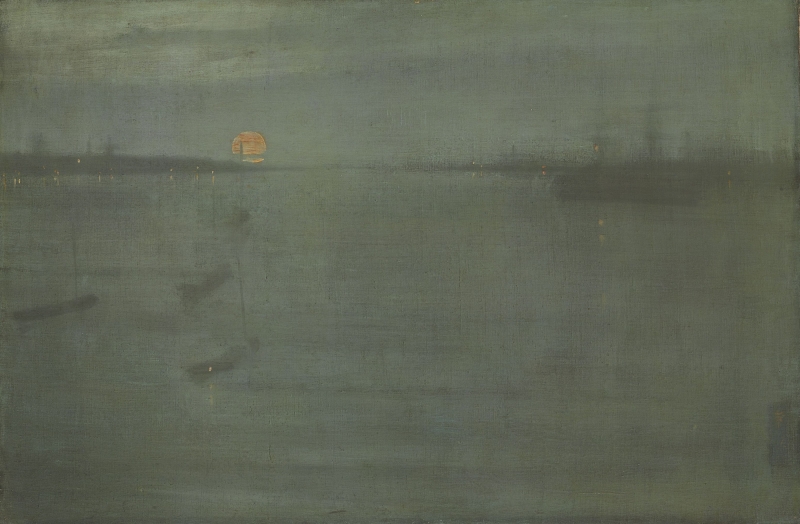Titles
Several possible titles have been suggested:
- Probably 'Nocturne in Grey and Gold' (1872, Dudley). 1
- 'Nocturne in grey and gold' (1873, S. Kensington Museum). 2
- Probably 'Nocturne in Grey and Gold' (1874, Flemish Gallery). 3
- ' "Nocturne in Grey & Gold" (Southampton Water)' (1874, Whistler). 4
- 'Nocturne in Grey & Gold - No. 1' (1878, Whistler) 5
- 'Nocturne in Blue and Gold' (1879, Grosvenor). 6
- 'Nocturne in Grey & Gold' (1879, Whistler). 7
- Probably 'Nocturne en bleu et or' (1883, Petit). 8
- 'Nocturnes ... "Blue & Gold" Southampton Water["]' (1892, Whistler). 9
- 'Nocturne Southampton Water' (1892, Whistler). 10
- 'Nocturne, Blue and Gold – Southampton Water' (1892, Goupil). 11
- Probably 'Nocturne – Blue and Gold' (1898, Goupil). 12
- 'Battersea' (1900, Art Institute of Chicago). 13
- 'Nocturne, Southampton Water' and 'Nocturne, Blue and Gold, Entrance to Southampton Water' (1905, ISSPG). 14
- 'Nocturne. – Southampton Water' (1905, Œuvres de James McNeill Whistler, Paris). 15
- 'Nocturne: Blue and Gold – Southampton Water' (1980, YMSM). 16
'Nocturne: Blue and Gold – Southampton Water' is the preferred title, based on the 1892 Goupil Gallery catalogue.
It was at an exhibition in the Dudley Gallery in 1872 that Whistler first exhibited paintings under the title of 'Nocturnes' (Nocturne: Blue and Gold - Southampton Water [YMSM 117] and Nocturne in Blue and Silver [YMSM 118]). The terminology was suggested by his patron Frederick Richards Leyland (1832-1892), and Whistler wrote to thank him:
'I say I can't thank you too much for the name "Nocturne" as a title for my moonlights! You have no idea what an irritation it proves to the critics and consequent pleasure to me - besides it is really so charming and does so poetically say all I want to say and no more than I wish. The pictures at the Dudley are a great success.' 17
Description
A harbour scene at night, in horizontal format. In the bay are several small boats at left, and tall sailing ships further out at right. At left and right, in the distance, there is more shipping, and at left and right, the sides of the bay. A large golden moon has just risen behind the left-hand promontory. A few lights reflect across the water from buildings on each side of the bay.
Site
Southampton, a major port on the south coast of England, UK.
In 1872 The Athenaeum called Nocturne: Blue and Gold - Southampton Water [YMSM 117] 'a pair' with Nocturne in Blue and Silver [YMSM 118], adding that it was 'the same part of the Thames under very different effects of light', which is not correct. 18
Whistler painted another, much darker nocturne of Southampton Water several years later (Nocturne in Black and Gold: Entrance to Southampton Water [YMSM 179]) and in the past their history has been confused.
Comments
The Art Institute of Chicago 'guide' comments:
'Although the work is based on his experience of the location, the specifics of place are inconsequential to it. Instead, Whistler was interested in the subtle harmony of shades of blue, punctuated by touches of gold. By blurring and obscuring the shapes of the distant boats, he made color and form the primary focus of the painting. Often misunderstood and sometimes openly ridiculed when they were first exhibited, Whistler’s luminous nocturnal visions were forerunners of the experiments in abstraction that would follow in the next century.' 19
Notes:
1: 6th Winter Exhibition of Cabinet Pictures in Oil, Dudley Gallery, London, 1872 (cat. no. 187).
2: International Exhibition, South Kensington Museum, London, 1873 (cat. no. 1556).
3: Mr Whistler's Exhibition, Flemish Gallery, 48 Pall Mall, London, 1874 (cat. no. 10).
4: Whistler to Alfred Chapman, 22 June 1874, GUW #11251.
5: Whistler to Anderson Rose, [November 1878], GUW #08784.
6: III Summer Exhibition, Grosvenor Gallery, London, 1879 (cat. no. 193).
7: Whistler to Alfred Chapman, 19 August [1879], GUW #07899.
8: Exposition Internationale de Peinture, Galerie George Petit, Paris, 1883 (cat. no. 7).
9: Whistler to D. C. Thomson, [4 January 1892], GUW #08214.
10: Whistler to D. C. Thomson, 28 February [1892], GUW #08213.
11: Nocturnes, Marines & Chevalet Pieces, Goupil Gallery, London, 1892 (cat. no. 20).
12: A Collection of Selected Works by Painters of the English, French & Dutch Schools, Goupil Gallery, London, 1898 (cat. no. 25).
13: Art Institute of Chicago, Twenty-First Annual Report of the Trustees, 1 June 1899-1 June 1900, pp. 15, 18.
14: Memorial Exhibition of the Works of the late James McNeill Whistler, First President of The International Society of Sculptors, Painters and Gravers, New Gallery, Regent Street, London, 1905 (cat. no. 9) in ordinary and deluxe editions respectively.
15: Œuvres de James McNeill Whistler, Palais de l'Ecole des Beaux-Arts, Paris, 1905 (cat. no. 67).
16: YMSM 1980 [more] (cat. no. 117).
17: Whistler to Leyland, 2/9 November 1872, GUW #08794.
18: Anon., 'The Winter Exhibition of Cabinet Pictures in Oil, Dudley Gallery', The Athenaeum, 2 November 1872, pp. 568-69, at p. 568.
19: Entry, Essential Guide, Art Institute of Chicago, 2013, p. 36.
Last updated: 19th April 2021 by Margaret







